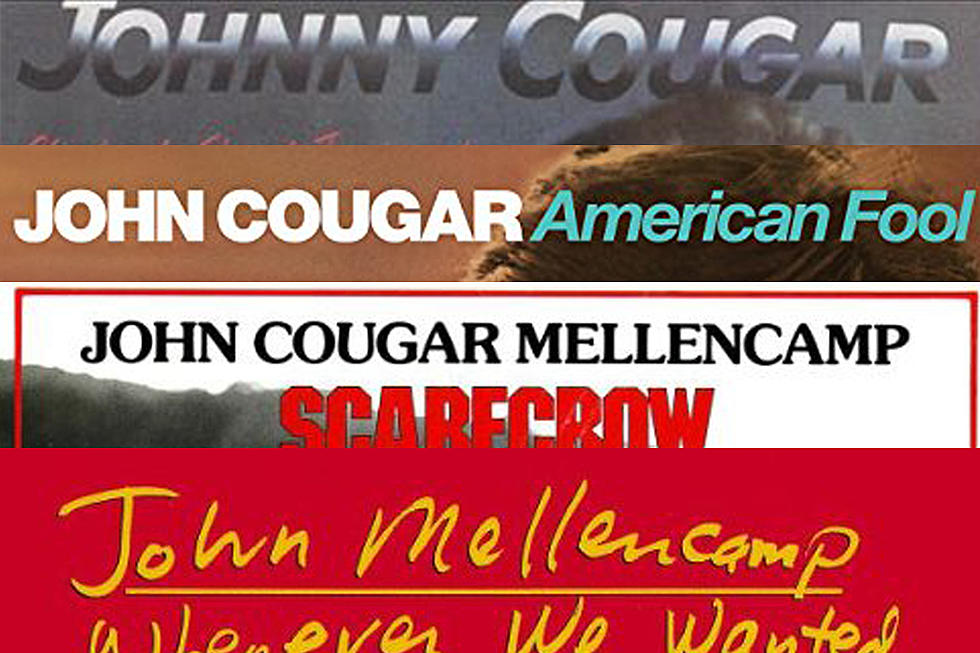
Inside John Mellencamp’s Long Battle to Escape ‘Johnny Cougar’
Early in his career, John Mellencamp had a choice. He could either change his name and release his first album on MCA Records, or he could head back home to Seymour, Ind. Potential rock stardom or a minimum wage job for the phone company – these were the options for the young singer, not even 25 years old, when presented with the stage name of Johnny Cougar.
“No one’s ever called me Johnny in my life,” Mellencamp complained, perhaps not knowing how to begin to address Cougar. He had been trying to gain attention from the music industry for a couple years, making routine trips to New York City from the Midwest, and had little luck. That is, until Tony DeFries heard his demo tape.
DeFries ran MainMan management, and his clients included David Bowie, Lou Reed and Iggy Pop. DeFries liked Mellencamp’s voice. He liked his James Dean look even more. What he didn’t care for was his strange German last name. The manager was convinced that no one was going to buy a record from a singer named Mellencamp.
“We wanted something uniquely American, something hot and wild,” MainMan associate Jamie Andrews told Seventeen magazine. “Johnny Indiana was one of our choices, Puma, Mustang – but nothing was as hot as Cougar!”
Mellencamp didn’t agree, but he went along with it to get his debut album released. “I would have signed anything – I would have signed the bottom of a shoe,” Mellencamp told Rolling Stone in 2013.
In the short term, the deal didn’t look so great for “Johnny Cougar.” When his debut album, 1976’s Chestnut Street Incident, moved only 12,000 copies and he was excoriated in the press as a slight Bruce Springsteen substitute, Mellencamp’s second LP, The Kid Inside, was shelved by MainMan. He soon was dropped by MCA.
Listen to Johnny Cougar's 'Chestnut Street'
Even though Mellencamp would admit the album wasn’t great, he blamed Johnny Cougar’s initial flame-out on DeFries and his rampant over-hyping of his new client. Despite the fact that Mellencamp had only begun to write songs, DeFries was comparing him to one of the greats: “He’s so American, the most American artist I’ve seen since Bob Dylan, and I think he will capture the same kind of thing Dylan did.”
After MCA walked away, so did MainMan, leaving Mellencamp with a flop, an unreleased album and a “pretty silly” name.
But rather than ditching the moniker, Mellencamp would alter it to simply John Cougar; he had always bristled at the idea of being “Johnny” anything. He needed a name that wouldn’t drive him crazy.
“I was washed up and over by my mid-twenties,” he said. “But I knew if I delivered a song that could get on the radio, I had a shot.”
He signed with new management and made a record in England. A Biography didn’t see release in the States, but scored an unlikely hit in Australia with “I Need a Lover.” Success, even down under, breeds opportunity, and the newly christened John Cougar got another shot at American rock stardom. “I Need a Lover” was added to his next U.S. album (titled John Cougar) and began a modest U.S. single for the singer, as well as a radio hit for Pat Benatar.
Watch John Cougar Perform 'I Need a Lover' on 'American Bandstand' in 1979
“There were always managers wanting to put their two cents in,” Mellencamp reflected in 2005. “But after that Johnny Cougar debacle, I pretty much rejected about everything they ever said.”
Still, Mellencamp would remain John Cougar through his 1982 breakthrough, American Fool, with its smash hits “Hurts So Good” and “Jack & Diane.” Having the No. 1 single and album on the Billboard charts (Mellencamp’s first and only chart-toppers) was both a blessing and a curse. As John Cougar, Mellencamp had fame, fortune and a Grammy, but he still wasn’t himself, literally.
Plus, DeFries decided to re-enter the Johnny Cougar market after American Fool. In 1983, he opened the vault and finally put out The Kid Inside, in a bid for cash from new Cougar fans hungry for more music. It would be the last album of Mellencamp’s career to not feature his real last name.
Being an MTV and radio star helped the singer-songwriter gain some more creative control, which showed in the sly songcraft and rougher sound of his next album, 1983’s Uh-Huh. It was also borne out on the LP’s cover, which featured the “new” name of John Cougar Mellencamp. In contrast to DeFries’ original judgment, it turns out a lot of people would buy records from a guy named Mellencamp. Uh-Huh went multi-platinum, delivering three Top 20 Billboard hits – “Pink Houses,” “Authority Song” and “Crumblin’ Down” – that remain some of his most famous songs.
Watch the Video for John Cougar Mellencamp's 'Authority Song'
If Mellencamp couldn’t outrun the “Cougar” just yet, he could record the kind of music he loved. Through the rest of the ’80s, John Cougar Mellencamp would write both deeply personal and political songs, add rustic touches of fiddle and accordion to his sound and continue to have hit singles and albums. Scarecrow, The Lonesome Jubilee and Big Daddy all went platinum (or better) while “Lonely Ol’ Night,” “Small Town,” “R.O.C.K. in the U.S.A.,” “Paper in Fire” and “Cherry Bomb” all hit the Top 10.
With a streak of success, both commercial and critical, Mellencamp finally reclaimed his name. When 1991’s Whenever We Wanted hit record store shelves, it bore the actual name of the man who made it: John Mellencamp.
The prolific musician been recording as himself, ever since. As John Mellencamp, he’s become one of rock’s elder statesmen, continuing to put out new music, tour the world and promote American farmers – as well as salve his passions in the visual arts. He’s been honored by ASCAP and the Americana Music Association, and he’s been inducted into the Rock and Roll Hall of Fame. Johnny Cash even called him one of music’s 10 best songwriters. Pretty high praise for a musician who’s seen as quintessentially American.
So if Tony DeFries wasn’t right that Johnny Cougar was “the most American artist [he had] seen,” he was just about on the money when it came to John Mellencamp.
Rock's Most Overshadowed Debuts
Odd Couples: John Mellencamp and Mick Ronson





